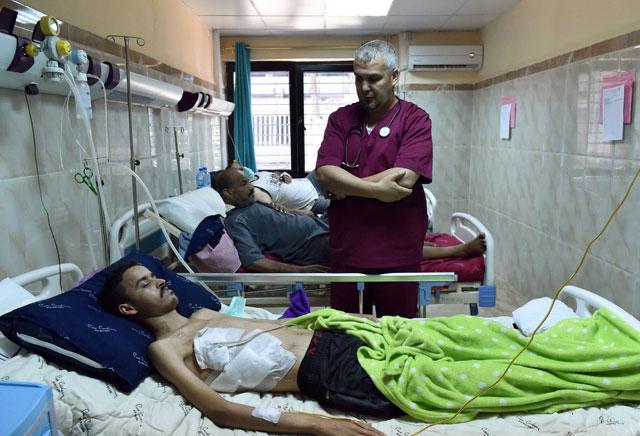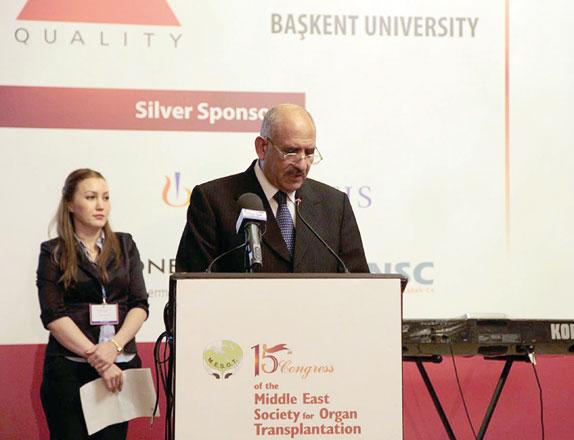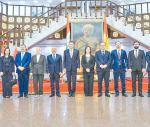You are here
In Algeria, taboos and law deter organ donors
By AFP - Sep 18,2017 - Last updated at Sep 18,2017

Algerian doctor Ahmed Bougroura (right), head of nephrology department at Batna's university hospital, 435km east of Algiers, talks to a transplanted patient on July 26 (AFP photo)
BATNA, Algeria — By donating one of her kidneys, Nawel gave her husband Boubaker Ziani a new lease on life after he had undergone 16 years of dialysis.
But in Algeria and across the entire Maghreb in North Africa, many people continue to suffer or die because of the lack of donors.
Part of the problem lies with laws restricting the harvesting of human organs, coupled with cultural or religious reticence, despite Muslim theologians' approval of organ donations.
Ziani's wife offered him a kidney after she saw that he had become too weak to play with or even to hold his children.
He had long rejected her willingness to help, but in the end as no other donor was available, he finally relented.
He had the operation at one of Algeria's two main centres for kidney transplants, the University Hospital in Batna, 435 kilometres east of Algiers.
"I'm like a newborn," Ziani told AFP, tears in his eyes.
In a consultation room, 47-year-old Abderahmane said he hoped an end to 24 years of dialysis was in sight thanks to a kidney from his mother.
"Dialysis has dominated my life. I want to take a break from this machine and live," he said.
He suffers from a hereditary condition that also affects two of his brothers. Lacking access to transplants, one of them has died and the other has now been on dialysis for two years.
More than 22,000 people in Algeria suffer from renal conditions and are forced to undergo dialysis, according to the ministry of health. A third are waiting for a transplant.
Most families refuse
Many others require liver donations, which can also be offered by live donors.
But under Algerian law, a living person can donate an organ only to a parent, child, sibling or spouse.
In the absence of a national database, the overall number of people awaiting transplants in Algeria is unknown.
Many patients are critically ill as they wait for organs such as a heart which can only be taken from deceased donors.
But the law says organs may only be removed from a dead person if their family agrees.
The overwhelming majority refuse, for lack of information, fear of violating religious laws or mistrust of doctors.
Some also suspect that transplants benefit only the privileged.
"Some families had never heard of donations from corpses before the death of a relative," said Dr Ahmed Bougroura, head of the Batna hospital's kidney health department and coordinator of the transplant team.
Theologian Kamel Chekkat, a member of Algeria's association of Islamic scholars, stressed that the practice was not religiously outlawed.
"From a religious point of view, there is nothing to oppose organ donation and the taking of organs from corpses," he said.
He and other Muslim theologians have argued that organ donation after death is "ongoing charity" — a pious act in Islam that outlives the person who performs it.
The gift of an organ fulfils "one of the major objectives of Islamic law, which is the preservation of life," Chekkat said.
As for the recipient, "whatever the religion of the patient... the law of God instructs us to preserve his life."
Public education required
In 2015, just two patients in Algeria — which has a population of more than 40 million — received donor kidneys, according to the Global Observatory on Donation and Transplantation.
The figures for Morocco and Tunisia were only marginally better, with fewer than 10 patients in each country receiving kidneys from the deceased.
"Organ donation... is struggling to gain a foothold in Morocco, even though there are no prohibitions: not medical, legal or religious," Moroccan organ registrar Said Sabri told AFP.
Dr Rafika Bardi, head of the Tunisian Centre for the Promotion of Organ Transplantation, said that "as in all the countries of the Maghreb... organ donations by the deceased are minimal".
She said the region lacked a "culture of donating organs" and that many people confuse organ donation with organ trafficking.
Algeria is considering changing the law to allow citizens to indicate in writing that they accept to have their organs removed in the event of their death, overriding refusals by their families.
However, specialists say that is not enough.
Campaigners in Algeria and Tunisia want to create registers of people who refuse to have their organs taken after their death — and anyone not on the list would be considered a potential donor by default.
Farid Sekouf, 41, who is finally preparing to receive his wife's kidney after six years on dialysis, believes the public needs more information on the issue.
"When it comes to going to vote, the state does all it can so that even a person in a tent in the Sahara is informed," he said.
Related Articles
Organ and cornea donation helps decrease treatment expenses for patients in need of transplants and revives their hopes for a healthy life, University of Jordan (UJ) Hospital Director Ahmad Tamimi said on Wednesday.
AMMAN — Two years ago, Sarah Hassan received a phone call that changed her life forever.The 15-year-old girl was born with keratoconus, a pr
AMMAN — Some 400 surgeons and medical experts from 31 countries convened in Amman on Wednesday for a conference on organ transplants.The 15t

















